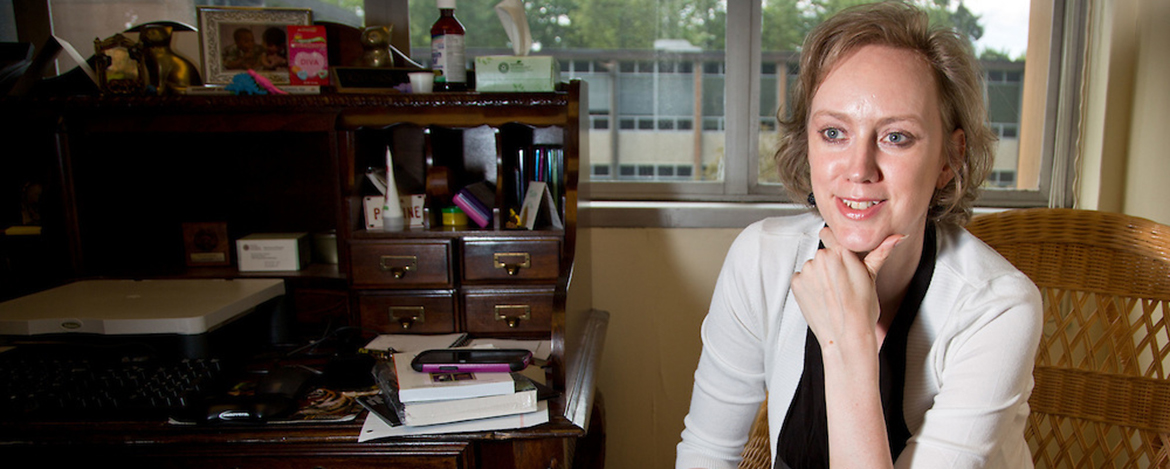Philosophical Discourse and Tweeting: On Dr. Pauline Shanks Kaurin’s Public Philosophy

Image: Dr. Pauline Shanks Kaurin, philosophy, is PLU’s resident Twitter Diva.
By Gillian Dockins '19
PLU Humanities
Following Dr. Pauline Shanks Kaurin’s recent publication in Newsweek, PLU’s Philosophy Department Chair sat down with me to discuss her article’s reception, the role of Twitter in philosophical discourse, and how philosophers of the modern day relate to the public.
The article, originally published by Just Security under the title “Just Another Mattis Pep Talk?: How ‘Hold the Line’ speaks to civilian and military audiences,” was picked up by Newsweek in late August, and republished under the title “After Mattis’ Remarks to U.S. Troops, Is A Military Coup In The Cards?”
As a military ethicist, Dr. Shanks Kaurin uses Twitter to engage in philosophical discourse with her audience of 2,680 followers. Dr. Shanks Kaurin gained initial inspiration for her article through a thread she began on her Twitter account. Analyzing Defense Secretary James Mattis’ remarks to troops stationed in Jordan, Dr. Shanks Kaurin shared her thoughts on the speech with this tweet: “Mattis is reflecting a line I have [heard] from many (mil esp but also civ): society is gone to hell and mil is only + last bastion of virtue,” she tweeted. The tweet gained traction, with numerous comments, retweets, and likes.
Mattis is reflecting a line I have from many (mil esp but also civ): society is gone to hell and mil is only + last bastion of virtue.
— Pauline Mistletoe Diva 🎅🎄🎁🎋❄☃❇👠🐒🐶🐻🏈 (@queenofthinair) August 26, 2017
As a military ethicist, Dr. Shanks Kaurin uses Twitter to engage in philosophical discourse with her audience of 2,680 followers. Dr. Shanks Kaurin gained initial inspiration for her article through a thread she began on her Twitter account. Analyzing Defense Secretary James Mattis’ remarks to troops stationed in Jordan, Dr. Shanks Kaurin shared her thoughts on the speech with this tweet: “Mattis is reflecting a line I have [heard] from many (mil esp but also civ): society is gone to hell and mil is only + last bastion of virtue,” she tweeted. The tweet gained traction, with numerous comments, retweets, and likes.
When engaging with Twitter as a platform for public philosophy, Dr. Shanks Kaurin is determined to have her online conduct reflect the commitments of her discipline. “I try to listen, and to ask questions, and to be charitable, and to try to understand what people are saying, more than putting out what I think,” she explains. “I use Twitter to explore what other people think and to try out ideas.” Dr. Shanks Kaurin brings her professorial techniques online with her. “It’s a lot like what I do with my classes when I walk in and say, ‘Here’s what I was thinking about today. What do you all think about this?’”
Although opening up philosophical conversations to the internet at large can be an inspiring and thought-provoking practice, philosophizing to a wide online audience brings its own challenges. Responses to public philosophy come from the public directly, and this can lead to negative interactions with a philosopher’s audience.
After the initial publication of Dr. Shanks Kaurin’s article on Just Security, the national magazine Newsweek republished and retitled the article without Dr. Shanks Kaurin’s knowledge. Newsweek and Just Security have a contractual agreement that the larger publication can republish the work of Just Security contributors. Dr. Shanks Kaurin only learned of this republication from the influx of hate mail she received following the release. “The media is a business and they are trying to drive traffic, but [the Newsweek title] was very inflammatory and didn’t really reflect the content of the article,” Dr. Shanks Kaurin explains. “A lot of people were reacting, as many of us do, to just the title and hadn’t read the article.”
Despite the negative reactions she received, Dr. Shanks Kaurin is still willing to engage with a broader audience online. In widening her audience to Newsweek readers, Dr. Shanks Kaurin considers the accessibility of philosophical writing. “I think academic philosophy is filled with bad writing,” Dr. Shanks Kaurin says, “[Philosophers] are writing to just a few other people and there’s a lot of jargon.” But Dr. Shanks Kaurin is careful to not fall into that trap. She says, “I try to aim for a well-educated, lay audience.”
Dr. Shanks Kaurin speaks to her audience not only as a specialist, but as someone they can relate to. Having recently followed Dr. Shanks Kaurin on Twitter myself, I was struck by the variety of content in the tweets she pens to her followers—mostly military people, ex-military people, and national security people in DC, according to Dr. Shanks Kaurin. Despite this specific audience, she doesn’t post exclusively on military ethics. Scrolling through her page, I found selfies, pictures snapped of her dog, and personal anecdotes. “Salon tomorrow. And Bed, Bath and Beyond to spend bday gift card from Parental Units. Taking ideas,” she crowdsources.
“I’m tweeting about my kids, and the shoes I’m buying, but there are also these more serious discussions,” Dr. Shanks Kaurin describes, “because I’m human, right? Philosophers are humans.”
Gillian Dockins is a PLU junior, majoring in English Writing, with minors in Music and Philosophy. She wrote this article as part of her work in English 320: Intermediate Creative Nonfiction.



